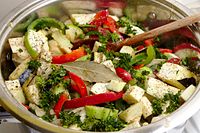Ratatouille
 | |
| Alternative names | Ratatouille niçoise |
|---|---|
| Type | Stew |
| Course | Main course |
| Place of origin | France |
| Region or state | Provence-Alpes-Côte d'Azur |
| Main ingredients | Vegetables (tomatoes, onions, courgette, aubergine (eggplant, brinjal), bell peppers, garlic, marjoram, fennel and basil or bay leaves and thyme |
| Variations | Confit byaldi |
Ratatouille (/ˌrætəˈtuːi/ RAT-ə-TOO-ee, French: [ʁatatuj] ⓘ; Occitan: ratatolha [ʀataˈtuʎɔ] ⓘ) is a French Provençal dish of stewed vegetables that originated in Nice and is sometimes referred to as ratatouille niçoise (French: [niswaz]).[1] Recipes and cooking times differ widely, but common ingredients include tomato, garlic, onion, courgette (zucchini), aubergine (eggplant, brinjal), capsicum (bell pepper), and some combination of leafy green herbs common to the region, such as chives or fennel.
Etymology
[edit]The word ratatouille derives from the Occitan ratatolha[2] and is related to the French ratouiller and tatouiller, expressive forms of the verb touiller, meaning "to stir up".[3][4] From the late 18th century, in French, it merely indicated a coarse stew. Modern ratatouille uses tomatoes as a foundation for sautéed garlic, onion, zucchini (courgette), aubergine (eggplant), bell pepper, marjoram, fennel and basil. Instead of basil, bay leaf and thyme, or a mix of green herbs like herbes de Provence can be used. The modern version does not appear in print until c. 1930.[5]
Preparation
[edit]The Guardian's food and drink writer Felicity Cloake wrote in 2016 that, considering ratatouille's relatively recent origins, there exists a great variety of methods of preparation for it.[6] The Larousse Gastronomique says, "according to the purists, the different vegetables should be cooked separately, then combined and cooked slowly together until they attain a smooth, creamy consistency", so that (according to the chair of the Larousse's committee, Joël Robuchon) "each [vegetable] will taste truly of itself."[7]
-
Ratatouille niçoise
-
Raw ingredients
-
Heavily simmered and garnished with fresh parsley
-
Small pyramid (Confit byaldi)
Related dishes
[edit]Similar dishes exist in many cuisines. These include: piperade (South-West of France), bohémienne (Vaucluse), chichoumeille (Languedoc), tian (South east of France), Confit byaldi (created by Michel Guérard), pisto (Castilian-Manchego, Spain), samfaina (Catalan, Spain), tombet (Majorcan), ciambotta, caponata and peperonata (Italy),[8] briám and tourloú (Greek), şakşuka and türlü (Turkish), ajapsandali (Georgian), lecsó (Hungarian), pinakbet (Filipino), ghiveci (Romanian) and zaalouk (Moroccan). Different parts of the Indian subcontinent have their own versions of winter vegetable stew. Gujarat makes undhiyu, Kerala avial (with coconut and local spices), and Bengal shukto.
In popular culture
[edit]In 2007, Walt Disney Pictures and Pixar Animation Studios released the film Ratatouille. The film features Remy, a young rat with an exceptional sense of taste and smell who dreams of becoming a chef. The climax of the film sees Remy prepare the titular dish in the form of confit byaldi for the notoriously harsh food critic Anton Ego, who unexpectedly loves the dish due to nostalgia for his mother's cooking of traditional ratatouille. The movie gave widespread exposure to this dish around the world.[9]
See also
[edit]References
[edit]- ^ "Ratatouille". Oxford English Dictionary, 2nd edition (1989)
- ^ « ratatouio », Lou tresor dou Felibrige, Frédéric Mistral
- ^ Alan Davidson (2014). The Oxford Companion to Food. Oxford University Press. p. 655. ISBN 978-0-19-967733-7.
- ^ "Chef Brian Discusses The Origin of Ratatouille Nicoise". LADC. Archived from the original on 9 October 2015.
- ^ Scotto, E., and Marianne Comolli. "Vegetables: A Garden of Eden." France, the Beautiful Cookbook: Authentic Recipes from the Regions of France. San Francisco: Collins, 1989. 195. Print."
- ^ Cloake, Felicity (15 July 2010). "How to make perfect ratatouille". The Guardian. Retrieved 9 September 2016.
- ^ Robuchon, Joël (2008). The Complete Robuchon. New York: Alfred A. Knopf. p. 597. ISBN 978-0-307-26719-1.
- ^ SophieCG (3 April 2014). "A Brief History Of Ratatouille". The Buzz. Retrieved 12 February 2025.
- ^ "Why ratatouille is more than just a dish | The Daily Nexus". The Daily Nexus | The University of California, Santa Barbara's independent, student-run newspaper. 3 November 2022. Retrieved 28 September 2024.





